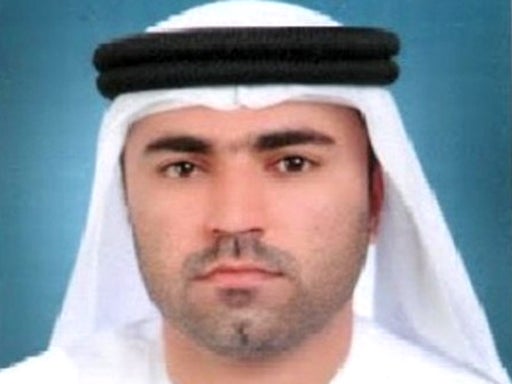UAE turns to deportation to silence regime's critics
Gulf state tries to send activist to remote Comoros Islands, then offers him Thailand

Your support helps us to tell the story
From reproductive rights to climate change to Big Tech, The Independent is on the ground when the story is developing. Whether it's investigating the financials of Elon Musk's pro-Trump PAC or producing our latest documentary, 'The A Word', which shines a light on the American women fighting for reproductive rights, we know how important it is to parse out the facts from the messaging.
At such a critical moment in US history, we need reporters on the ground. Your donation allows us to keep sending journalists to speak to both sides of the story.
The Independent is trusted by Americans across the entire political spectrum. And unlike many other quality news outlets, we choose not to lock Americans out of our reporting and analysis with paywalls. We believe quality journalism should be available to everyone, paid for by those who can afford it.
Your support makes all the difference.The United Arab Emirates is trying to deport an activist to a country he has never set foot in, with a human rights group accusing the oil-rich state of increasingly wielding its power to grant or deny citizenship as a tool to crush any Arab Spring-style uprising.
While revolts have gripped many countries in the Middle East, the Gulf states have largely managed to escape the protests as their people enjoy the rewards of oil wealth, with well-paid state employment and benefits.
Still, there have been some signs of dissent, but these were dealt with in a swift and quiet crackdown. Members of the "UAE 5" group spent eight months in jail last year after signing a petition with more than 100 academics and other activists calling for universal suffrage. Several non-governmental organisations were dismantled. Now it seems the UAE is employing another tool to deal with dissenters. Ahmed Abdul Khaleq, one of the UAE 5 who was again detained without charge two weeks ago, called his family yesterday to tell them he was being deported to Thailand. The activist and blogger was initially told he would be sent to the Comoros Islands, off the coast of Madagascar.
Last week, seven members of Al Islah, an Islamist group affiliated to the Muslim Brotherhood, lost their battle to sue the interior ministry over its decision to strip them of citizenship after they were accused of perpetrating "acts threatening the national security of the UAE". They have spent two months in jail after refusing to sign a pledge promising to seek citizenship elsewhere.
"The UAE is increasingly using citizenship as a way to control dissent. It has become the latest weapon for UAE authorities eager to silence critics," said Samer Muscati, of Human Rights Watch. "It seems that arbitrary arrests, detentions and criminal trials against those who oppose the government are no longer enough. Now the authorities are trying to silence their critics by threatening to strip them of their citizenship and deport them."
Mr Khaleq's case highlights the precarious plight of the country's stateless bidoon people – literally meaning "without" in reference to their lack of citizenship. Between 10,000 and 100,000 bidoon live in the UAE. Most trace their roots to Iranian or South-east Asian traders who travelled to the emirates looking for work before the UAE was formed in 1971, or to nomads that traversed porous borders around the Gulf and failed to register for citizenship or lacked the preferred tribal affiliations.
Without documents such as passports, they are unable to leave the UAE and are forced to pay for the education and healthcare that comes free to Emiratis. Mr Khaleq's family emigrated from Pakistan's Balochistan province in the 1960s. He found himself in the government's sights as one of the UAE 5. While the others were quietly freed, the government appears to have seized upon Mr Khaleq's lack of citizenship. He was pressured into applying for a passport from the Comoros Islands, which has reportedly received $200m from the Gulf state to process passports for the bidoon, notionally to help them eventually obtain UAE citizenship.
But the day after his application was approved a fortnight ago, he was summoned to the immigration department, detained and told he was being deported to the archipelago. The Comoros, however, refused to play ball.
Mr Khaleq was then presented with a new choice for his exile – Iran, Pakistan, Bangladesh, India or Thailand. "He has chosen Thailand," said Ahmed Mansoor, another of the UAE 5 who is in contact with Mr Khaleq's relatives. "He called his family [yesterday], confirmed to them that a final decision about his deportation [has been] taken and he will be deported next week."
No one from the UAE interior ministry was available to comment.
Subscribe to Independent Premium to bookmark this article
Want to bookmark your favourite articles and stories to read or reference later? Start your Independent Premium subscription today.
Join our commenting forum
Join thought-provoking conversations, follow other Independent readers and see their replies
Comments